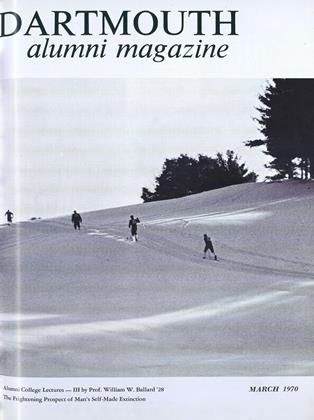Selectedby Richard Eberhart. Hanover: DartmouthPublications, 1969. 65 pp. $2.
Most writing teachers will confess that what they hope for most in a student is his realization of a voice that is of his time yet uniquely his own. To find three or tour in any one class is a great pleasure; to find twenty-six over the course of a year, a great privilege. Poet Richard Eberhart bears generous witness to this privilege in SixtyDartmouth Poems, containing works by twenty-six of his students from the previous year. In turn, they in their poems bear witness to the salutary influence of Dartmouth's Poet-in-Residence. The lines by Gregory Curtis in "The Poet Foresees His Death" are an implicit tribute to much that Eberhart has striven for in his own poetry:
Dig me full and wide and deep for all the earth's bright lands I keep. Let the wind come here to sleep.
But the voices are infinitely various. In so short a space it is perhaps best to let as many of them as possible be heard. There are Fred Fountain's reflective reading of nature as symbol, I am found in a long lost orchard. The venerable partridge, walking On a tour of ancient apple trees, Condescends to forget me, Roger Fritz's mind-releasing caprice, in the meantime I think of the air as a white tarboosh thrown about the neck of a more grand aviator for whom the dawn is no more than a mustache, the sardonic voice of the poet in the city, this time Peter Kaldheim's, Times Square, why the hell Do you blink so much? Are you nervous? Arnold Weingart's mock-heroic, yet agonizingly real, cat, Felled by a chrome claw The calico Thinks of yesterday's grasshoppers, his Persian mistress, sucks a breath And purrs red on the pavement, Already dead before his tail Stops twitching, feels genuine remorse for His unwashed paws, and lan Alsop's capturing in two lines of a faithfully imagined Ezra Pound, Regret is an odour around his face; His visitors are wary of him.
There are Jonathan Cheney's image of icefishing, vivid enough to make the reader flinch, He kept the slim, green perch in a hollow in the ice, their grim, pink gills gasping and the perennial, painfully beautiful subject of love in Robert Sharpe's untitled poem:
Where shall I go? Water is too sweet For I have wet Your lips And we touched this earth We breathed this air Where there is but fire
Finally, there are those longer flights, such as "Strange Beauty" by Curtis Nichols and Richard Osberg's "Portage out of Thraxos. In both one thrills at the sense of reservoirs Of power, newly discovered and tapped.
Sixty Dartmouth Poems, the largest and richest collection from Eberhart's students yet, bears reading not only by those who would see where poetry is at Dartmouth today but also by those who would understand the most sensitive sort of undergraduate mind.
Mr. Siegel, an Assistant Professor of Englishat Dartmouth, is himself a poet.
 View Full Issue
View Full Issue
More From This Issue
-
 Feature
FeatureThe Rise and Fall of Humanity
March 1970 By WILLIAM W. BALLARD '28, -
 Feature
FeatureTHE DICKEY ADMINISTRATION ENDS BUT NOT ITS PERVADING IMPRINT
March 1970 -
 Feature
FeatureDartmouth's Priorities for 1970
March 1970 -
 Article
ArticleThree Students Argue for Coeducation
March 1970 By CHERYL CAREY, Coed, RANDY PHERSON '71, RICHARD ZUCKERMAN '72 -
 Article
ArticleThe Undergraduate Chair
March 1970 By WINTHROP A. ROCKWELL '7O -
 Article
ArticleAn Antidote to Hugeness
March 1970 By CARLOS H. BAKER '32
Books
-
 Books
BooksFACULTY PUBLICATIONS
December 1916 -
 Books
BooksAlumni Articles
JANUARY 1970 -
 Books
BooksTAMING MEGALOPOLIS. WHAT IS AND WHAT COULD BE (Vol. 1). HOW TO MANAGE AN URBANIZED WORLD
JANUARY 1968 By DAVID R. GODSCHALK '53 -
 Books
BooksWILD BIRDS AT HOME
November 1935 By Dr. Frederic P. Lord '98 -
 Books
BooksWITCHES RIDE BROOMS...TO BRUSH THEIR TRACKS AWAY.
November 1954 By GEORGE R. DALPHIN '47 -
 Books
BooksTHE MYTH OF ROME'S FALL.
JUNE 1959 By NORMAN A. DOENGES



